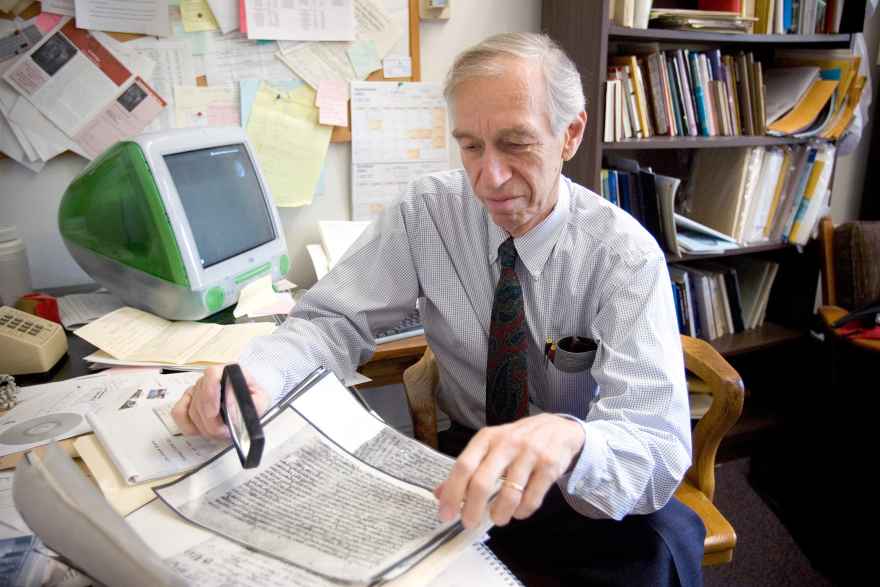Norman Golb, Renowned Scholar of Medieval Jewish History, 1928-2020

The following was published in UChicago News on January 13, 2021.
By Sara Patterson
Prof. Emeritus Norman Golb, a multilingual scholar renowned for his pioneering research about medieval Jewish history and the Dead Sea Scrolls, died on Dec. 29. He was 92 years old.
Remembered by his students as an intellectually generous, kind and patient teacher, the University of Chicago professor of more than 50 years was known for his encyclopedic knowledge—particularly in the study of Qumran, the West Bank archaeological site where the Dead Sea Scrolls were discovered. A prolific author, Golb was fluent in Hebrew and Arabic and used his expertise to examine primary sources.
“Norman was the master of two demanding fields of study, a proficient multilinguist and a scholarly bloodhound, forever in pursuit of new information,” said Joshua Holo, PhD’00, a former student who is now a dean and an associate professor of Jewish history at Hebrew Union College in Los Angeles. “He spent countless hours in archives around the world. Norman had a prodigious memory—not just for texts but also for the handwriting of their composers.”
The impact of his scholarship extended to his students. Eve Krakowski, PhD’13, credits Golb as an intellectual mentor who taught her “how to conduct scholarly research, examine historical problems and interact with sources.”
“Norman asked questions about his sources that no one else thought to ask,” said Krakowski, now an assistant professor in Princeton University’s Department of Near Eastern Studies. “He shifted preconceived notions on their head because he was unbound by scholarly paradigm.”
In 1980, Golb published a pioneering thesis that contradicted the established belief that a Jewish sect called the Essenes wrote the Dead Sea Scrolls found in the caves at Qumran. Instead, he argued that multiple Jewish communities wrote the scrolls in Jerusalem and moved them to Qumran in anticipation of the Roman siege of the city in 70 A.D.
“I believe Norm will best be remembered for his work on the Dead Sea Scrolls,” said Christopher Woods, the John A. Wilson Professor of Sumerian and the director of the Oriental Institute at UChicago. “It was a very controversial and radical idea at the time. Norm’s thesis is most synthetically advanced in his 1995 book, Who Wrote the Dead Sea Scrolls? The Search for the Secret of Qumran. His work intensified the debate over the origins of the Dead Sea Scrolls, which continues today.”
Golb’s wide-ranging discoveries included the identification of Obadiah the Proselyte as the author of the oldest Hebrew musical manuscript in the 12th century; the first documentary proof that the Khazars converted to Judaism; and the various manuscripts pertaining to the Jews of medieval Normandy. First published in 1976 in Hebrew, his acclaimed book Toledot hayehudim be’ir Rouen bimé habenayim (History and Culture of the Jews of Medieval Rouen) was translated into several languages.
Golb’s deep knowledge of the Hebrew and Arabic languages and linguistics, said his son Raphael, allowed him to apply an “exacting methodology” in his scholarship.
Renowned for his scholarship, Norman Golb also successfully campaigned for wider access to the Dead Sea Scrolls, setting a precedent to help expand the study of the original texts.
Photo courtesy of the Hanna Holborn Gray Special Collections Research Center
In 1985, the French city of Rouen awarded Golb its Grand Medal. He later received an honorary doctorate from the University of Rouen and the Medal of the Region of Haute Normandie.
“Norman was a brilliant scholar, and his work on the forgotten Jewish history of medieval Rouen, France, was one of his most significant academic achievements,” said Martha T. Roth, the former dean of the Division of the Humanities and the Chauncey S. Boucher Distinguished Service Professor in the Department of Near Eastern Languages and Civilizations and the OI. “However, his lasting legacy will be his rigorous campaign to allow all qualified researchers to study the Dead Sea Scrolls.”
For many years after their discovery in 1947, only a few select scholars could examine the Dead Sea Scrolls. Golb led a successful effort to open wider access to the scrolls, setting a precedent to help expand the study of the original texts.
Golb was born Jan. 15, 1928, to working-class parents in Chicago. He studied at the Oriental Institute before earning his PhD in Judaic and Semitic studies in 1954 at Johns Hopkins University. After postdoctoral fellowships at Dropsie College in Philadelphia and the Hebrew University of Jerusalem, Golb taught at the University of Wisconsin and at the Hebrew Union College in Cincinnati.
He returned to Hyde Park in 1963, accepting a position teaching Hebrew and Judeo-Arabic studies in the Department of Near Eastern Languages and Civilizations and at the OI. In 1988, Golb was named the Ludwig Rosenberger Professor in Jewish History and Civilization, a position he held until his retirement in 2015. At his retirement ceremony, then-department chair Theo van den Hout said: “You would always remind us of the qualities and principles that make the University of Chicago what it is.”
Golb is survived by Ruth, his wife of more than 70 years. “We met just a few years after the Holocaust, and because we were very young—kids, really—I had no idea where Norman’s hopes and dreams would take him, but what I did know was that he shared my values of kindness, generosity, and concern for Judaism, ” she said.
In addition to Ruth and his son Raphael, Golb is survived by two other children, Joel and Judith; a granddaughter, Dana Vowinckel; his sister, Harriet Baker; two nieces and many cousins. Funeral services were held virtually in December.